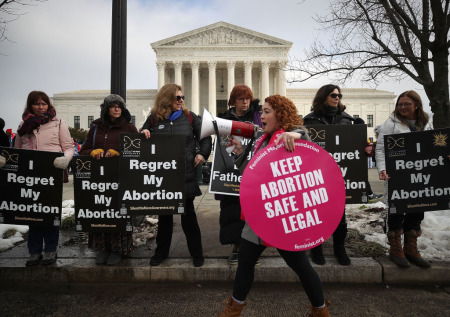Abortions rise to highest rate in over a decade amid abortion pill spike: report

Abortions performed in the United States increased in 2023 by 10% since 2020 to the highest rate and total in more than a decade, according to updated estimates from the pro-choice Guttmacher Institute, drawing skepticism from a pro-life researcher.
The recent Guttmacher Institute data comes from its Monthly Abortion Provision Survey, which is not the same as the Abortion Provision Census the organization conducts every three years.
The organization reports that there were an estimated 1,026,690 abortions in the formal U.S. healthcare system in 2023, up 10% from 2020. Furthermore, the percentage of abortions that were chemical abortions rose from 53% in 2020 to 63% in 2023.
The study also found that almost every state that did not have what the Guttmacher Institute described as a "total abortion ban" saw their abortion numbers exceed their 2020 totals.
"The 10% increase at the national level in many ways understates the degree to which health systems, providers and support networks have had to scale up care in certain states: States without total bans experienced a 25% increase in abortions in 2023 compared with 2020," the Guttmacher Institute reported. "The sharpest increases were seen in states bordering ban states, where abortions increased by 37% from 2020 to 2023."
Rachel Jones, Guttmacher's principal researcher, said in a statement that as states pass abortion restrictions, chemical abortions may be the most viable or only abortion option for some people even if they prefer an in-person abortion.
"Thus, it is important to keep in mind that an increase in medication abortion does not necessarily indicate that all people using this method prefer it," Jones said.
Michael New, senior associate scholar at the pro-life research organization Charlotte Lozier Institute and an assistant professor of social research at the Catholic University of America, responded to Guttmacher's data in a National Review op-ed Tuesday.
New analyzed the latest Guttmacher Institute figures, findings that appear to be consistent with a trend in increasing abortion rates. According to New, this trend began in 2017, five years before the U.S. Supreme Court ruled the Constitution doesn't confer a right to abortion and that states can legally restrict the practice.
"By Guttmacher's own admission, the calculations for the Monthly Abortion Provision Survey come from 'a slimmer portfolio of data' and are designed to produce faster calculations on the incidence of abortion," New wrote. "Given that, the 2023 abortion estimates may not be as reliable as Guttmacher's previous annual abortion estimates."
New speculated that some media outlets will use these abortion estimates to frame pro-life laws as "ineffective." But he maintains that the data, when taken at "face value," would indicate that expanded access to chemical abortions increases the abortion rate.
Access to chemical abortion has expanded over the years, with the U.S. Food and Drug Administration extending the gestational limit in 2016 from 7 weeks to 10 weeks. The FDA further loosened abortion pill restrictions during the COVID-19 pandemic first by temporarily suspending an in-person doctor requirement, a decision the agency later made permanent.
"Even though these new data indicate that the incidence of abortion has increased since the [Supreme Court's] Dobbs decision [in 2022], there is still very strong statistical evidence that newly enacted pro-life laws are preventing abortions and saving lives," New asserted.
Data released by the Texas Health and Human Services Commission (HHS) last year found three abortions were performed in the state in August 2022. In addition, the report found that none of the abortions committed in August 2022 were elective, and all were reported to have been "medically necessary."
In July 2022, following the Supreme Court's reversal of Roe v. Wade the previous month, 68 abortions were performed in Texas, according to the data.
According to a report that the IZA Institute of Labor Economics published in November 2023, 13 states that enacted abortion bans after the Dobbs ruling saw approximately 32,000 additional annual births.
Samantha Kamman is a reporter for The Christian Post. She can be reached at: [email protected]. Follow her on Twitter: @Samantha_Kamman






















